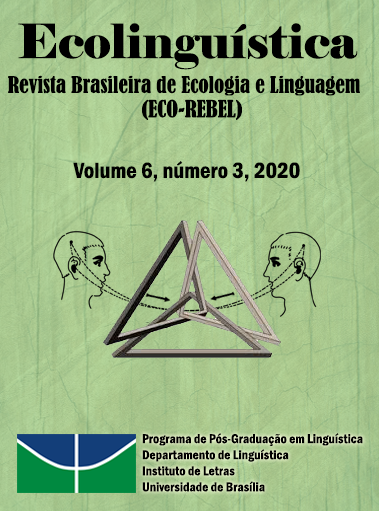A natureza da pandemia: uma análise ecolinguística crítica das representações do meio ambiente em textos sobre o coronavírus
Keywords:
Meio ambiente; Coronavírus; Ecolinguística Crítica; Discurso; Apagamento discursivo.Abstract
Fundamentado na abordagem teórico-metodológica proposta pela Ecolinguística Crítica (STIBBE, 2014; 2015), este estudo busca investigar como o meio ambiente vem sendo representado discursivamente em textos que abordam a questão da pandemia causada pelo coronavírus. Para tanto, analisa três textos produzidos pelo Programa das Nações Unidas para o Meio Ambiente (PNUMA) e publicados entre março e maio de 2020, focando na investigação da categoria apagamento discursivo (STIBBE, 2014; 2015). A análise discursiva dos textos produzidos pela agência da Organização das Nações Unidas (ONU), considerada uma autoridade global quando o assunto é meio ambiente, indica que a Natureza é frequentemente submetida a um apagamento de tipo traço (trace), figurando apenas como um reservatório natural que está a serviço da humanidade.
Downloads
References
COUTO, Hildo Honório. Ecolinguística: estudo das relações entre língua e meio ambiente. Brasília: Thesaurus, 2007.
COUTO, Hildo Honório. O que vem a ser ecolinguística, afinal? Cadernos de Linguagem e Sociedade, v. 14, n. 1. Brasília: Thesaurus, 2013.
FAIRCLOUGH, Norman. Analysing Discourse: Textual Analysis for Social Research . London: Routledge, 2003.
KRESS, Gunther. Multimodality: a social semiotic approach to contemporary communication. London: Routledge, 2010.
KRESS, Gunther; VAN LEEUWEN, Theo. Reading Images: the grammar of visual design. London/New York: Routledge, 2006.
LATOUR, Bruno. Diante de Gaia: oito conferências sobre a natureza no antropoceno. São Paulo: Ubu Editora, 2020.
LOCKE, Terry. Critical Discourse Analysis. London: Continuum, 2004.
NAESS, Arne; SESSIONS, George. Basic principles of Deep Ecology. Ecophilosophy, v. 6, p. 3-7. 1984.
ONU. Nações Unidas Brasil. 2020. Disponível em: <https://nacoesunidas.org/agencia/pnuma/>. Último acesso: 12 jul. 2020.
PENA-VEGA, Alfredo. O despertar ecológico: Edgar Morin e a ecologia complexa. Rio de Janeiro: Garamond, 2005.
STIBBE, Arran. Ecolinguistics and erasure: restoring the natural world to consciousnesses. In: HART, Christopher; CAP, Piotr (Ed.). Contemporary Critical Discourse Studies. London/ New York: Bloomsbury Publishing Plc, 2014.
STIBBE, Arran. Ecolinguistics: language, ecology and the stories we live by. London: Routledge, 2015.
VAN DIJK, Teun (Ed.). Discourse Studies: a multidisciplinary introduction. London: Sage, 2011.
Downloads
Published
How to Cite
Issue
Section
License
Copyright (c) 2020 Ecolinguística: Revista brasileira de ecologia e linguagem (ECO-REBEL)

This work is licensed under a Creative Commons Attribution-NonCommercial-NoDerivatives 4.0 International License.
Authors who publish in this journal agree to the following terms:
Authors retain copyright and grant the journal the right of first publication. The work is simultaneously licensed under the Creative Commons Attribution License allowing the sharing of the work with acknowledgment of the authorship of the work and initial publication in this journal.
Authors are authorized to enter into additional contracts separately for non-exclusive distribution of the version of the work published in this journal (e.g., publishing in institutional repositories or as book chapters), with acknowledgment of authorship and initial publication in this journal.
Authors are allowed and encouraged to post and distribute their work online (e.g., in institutional repositories or on their personal page) at any point before or during the editorial process, as this can bring about productive revisions as well as increase impact.
Citation of published works (See The Effect of Free Access).



3.png)



